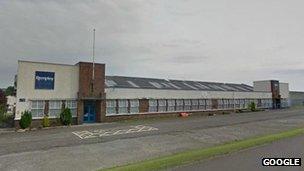Dundee Remploy factory plan 'not feasible'
- Published

The working group says turning Dundee's Remploy factory into a social enterprise is not feasible
A plan to run a Dundee factory employing disabled workers as a social enterprise have proved infeasible.
The Dundee site was one of 32 Remploy businesses marked for closure in 2012, after the UK government announced it was "not commercially viable".
The cross party Remploy Working Group had hoped to create a new company to continue production at the site.
It will now focus on finding alternative work for the staff elsewhere.
The Remploy factory in Dundee provides supported employment for about 45 disabled people.
Alternative bids for the Dundee site are still being considered with the deadline remaining open until 17:00 on 28 March.
Remploy were keen to stress no decision has yet been made about the future of the factory in Dundee or the future of its employees.
Chairman of the working group, Dundee's Lord Provost, Bob Duncan, said: "The short timescale, the delay between us asking for access to their electronic data room and getting in and the limited information made available from Remploy has frustrated us at every turn.
"From that partial amount of information we were able to get it became clear that it is impossible to separate the costs of Dundee, Stirling and Clydebank factories as individual operations."
'Too much risk'
He added: "In addition, because of the way Remploy is structured there was simply no way of finding out where costs and income actually lie so that intelligent decisions about the future could be made.
"Our best estimate is that the factory loses £1m a year and has been doing so for several years.
"Unfortunately in the end there is simply too much risk of committing the council, or any social enterprise it might support, to unknown liabilities."
A spokesperson for Remploy said: "It is disappointing the Dundee working group led by the Lord Provost of Dundee feels it is unable to submit a high level bid for the site.
"On 12 December 2012 Remploy launched a commercial process which invited bids from individuals or organisations interested in the Frontline Textiles business or its individual sites at Dundee, Clydebank and Stirling.
"Once the bid deadline has passed any bids received for the site will be assessed and only then will any decisions about the future of the factory be made."
Following the announcement by Westminster last year to close the factory, Dundee City Council established a cross-party group of MPs, MSPs, councillors and trade unions to look at the feasibility of bidding for the business and creating a sustainable enterprise.
One route the group explored was the possibility of a "phoenix" company, preferably a social enterprise, taking on the contracts and activities of Remploy's Dundee operation.
Lord Provost Duncan said: "Under the circumstances we did not want to give false hope to the workforce, many of whom are vulnerable, or perhaps worse, to create a new company that would only exist for a short time before it became clear that it was unsustainable.
"Our view, based on all of the work that has been done, is that a bid for the Frontline Textiles operation in Dundee was unrealistic and that it is not sustainable at any reasonable level of subsidy.
"Instead, the working group is exploring alternative sustainable employment for staff of Remploy Dundee who want to stay in the labour market, given that a bid for the factory is no longer a feasible option."
- Published18 December 2012
- Published29 November 2012
- Published4 July 2012
- Published7 March 2012